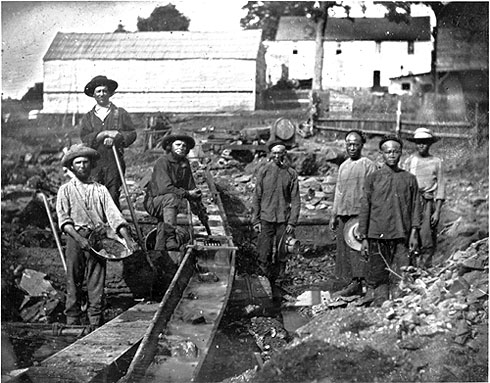Two coincident events - the
discovery of gold in California's American River, in January of
1848, and the ascendency of Manifest Destiny as a national
doctrine of expansion, combined forces in the American psyche to
launch one of the most cataclysmic social movements in American
history.
In many respects, the Gold
Rush was the nation's first large scale media event. (click here for
more)Penny newspapers were published in every neighborhood, and
their fantastic tales of sudden fortune enflamed the imaginations
of the entire nation. Young men looking for a way out of the
tedium of urban living, or for an alternative to a life of drudgery
on the family farm, soon packed their rucksacks and headed west to
claim their fortunes. click here for more on gold rush

49'ers on a placer claim in the Sierra Nevada
mountains.
In 1848 there were three ways
to get to the gold fields from the East Coast; around Cape Horn on
a clipper ship; Overland, by foot, on horseback, or wagon; or
across the Isthmus of Panama and up the coast. Of the three,
overland, across two thousand miles of arid and hostile Indian
Country, was the most dangerous.
Nevertheless,
by the summer of 1849 (49ers), the tiny seaside fishing village of
San Francisco exploded from a few hundred fishermen to a population
of 30,000 speculators, entrepreneurs, snake oil salesmen, whores
and vagabonds. By the end of the year, 90,000 immigrants had
arrived in the gold fields of the Sierra Madre mountains where they
set up rough 'n tumble camps on the banks of every
river. Lynch law ruled in those camps, and
Anglo-American immigrants were determined to push out all people of
color. These men wanted one thing: to make their strike
and go home. A few did, but most did not, and as months
went by, optimism turned to despair and treachery, and tales of
wretched desperation far outnumbered the stories of sudden riches.
For
more, click here
The territory
was rushed into statehood in 1849. As one historian
commented, California came into the union as a gold nugget dripping
blood. Forty-niners had no use for the peaceful Indians whose
civilization had thrived there for thousands of years. Only
one in six Indians survived California's first decade of statehood,
and no white man was ever prosecuted for killing an Indian.
Related People
Related Events
Related Flashpoints